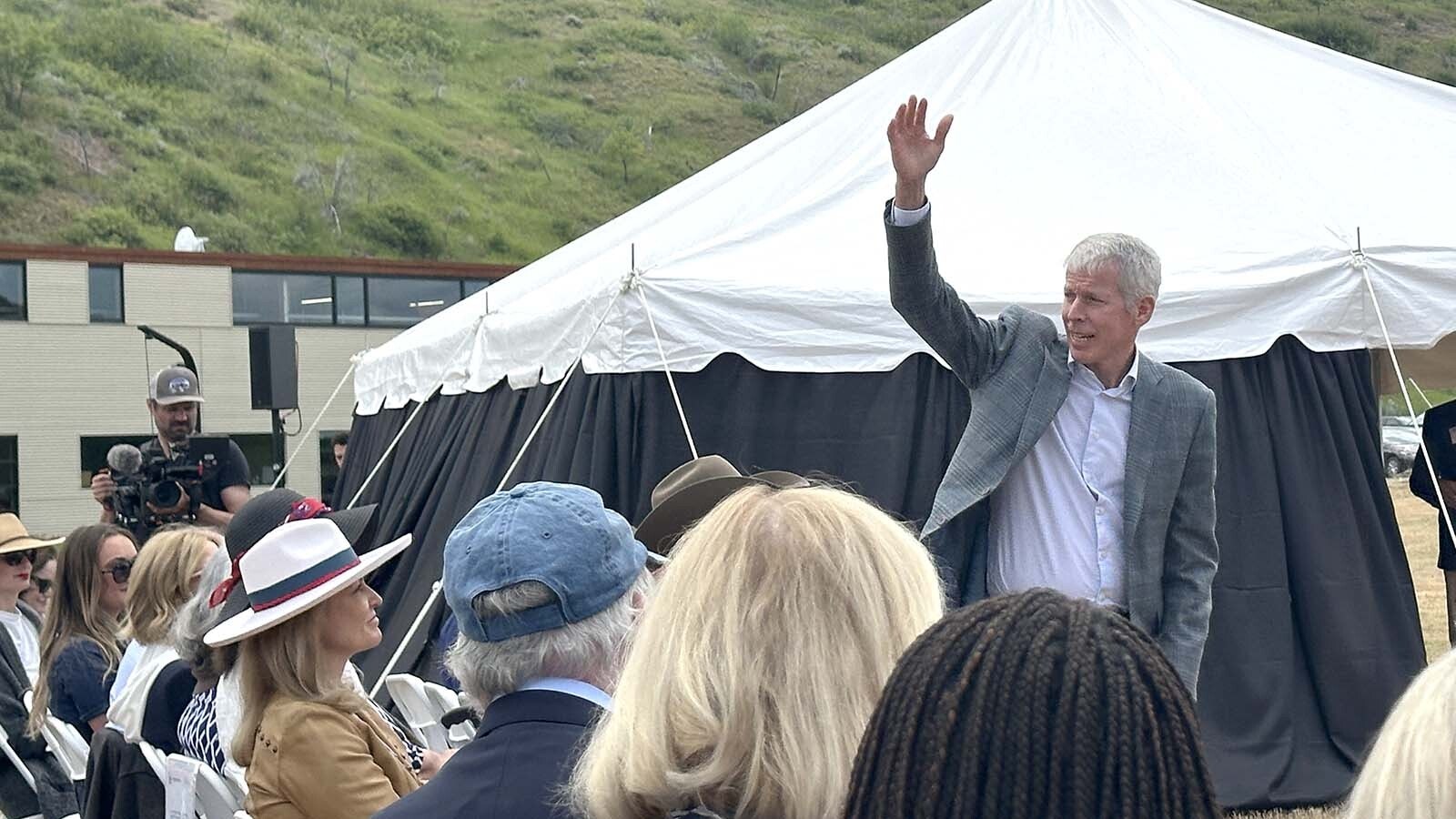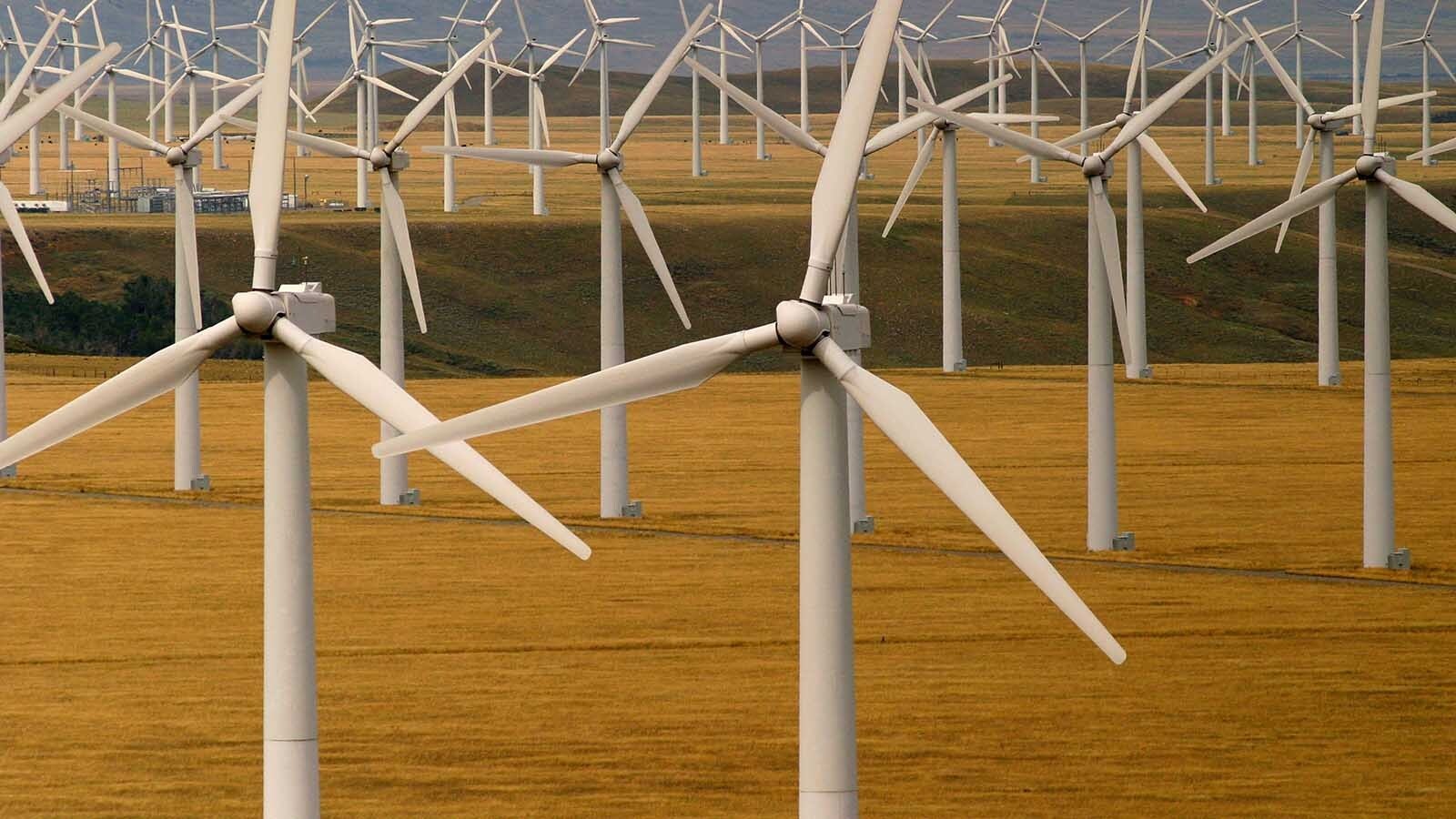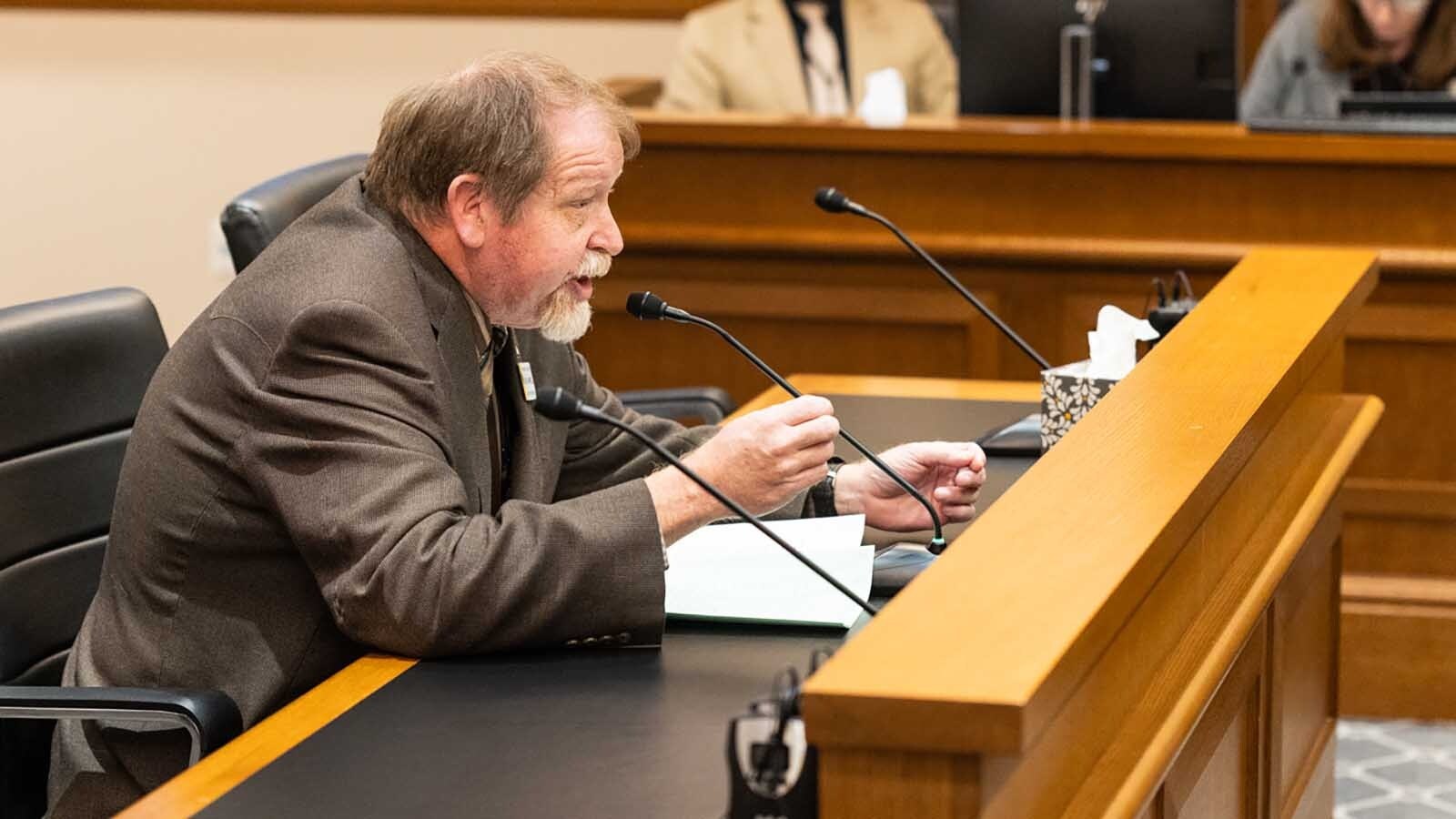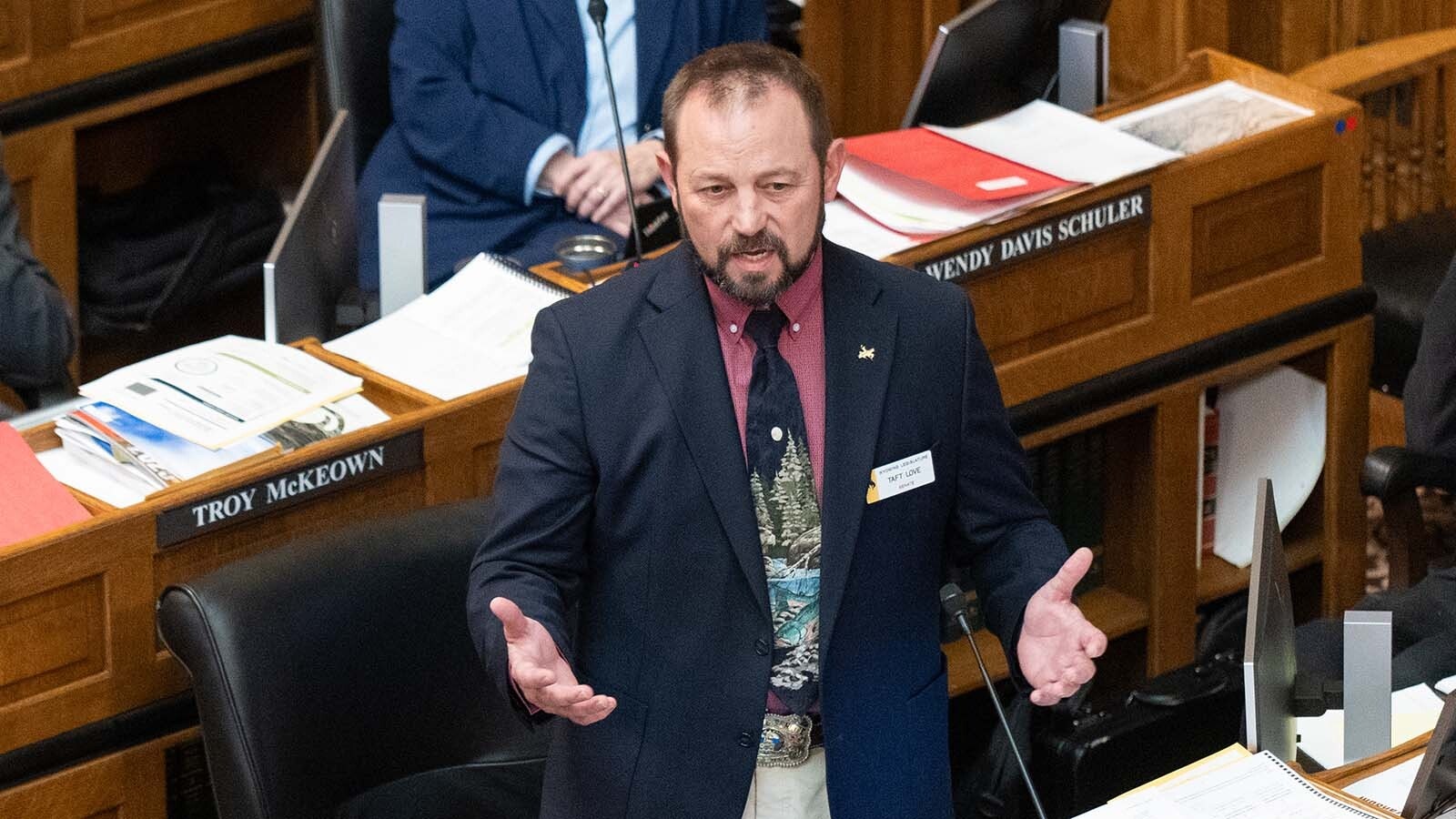RANCHESTER — U.S. Energy Secretary Chris Wright arrived at Wyoming's newest rare earth mine Friday carrying more than ceremonial shovels. The Denver-based Liberty Energy CEO turned Trump cabinet member brought a comprehensive worldview that challenges much of the Biden administration’s energy policies.
He’s been on the forefront of Trump’s push for fossil fuels, and a target for climate change advocates who disagree.
In Wyoming, surrounded by a friendly audience of coal industry supporters — including most of the state’s top elected officials — Wright took on what he described as politically motivated energy policies that ignore economic realities.
Projecting a dynamic personality and energetically speaking to the crowd gathered for a ribbon cutting ceremony, and then later for a mine tour, Wright showed off political skills and his command of the technical details when it comes to everything from mining rare earth minerals to the politics of climate change.
Opening the first new rare earth mine in the United States in 70 years had all eyes on Ranchester in northern Wyoming and Ramaco’s Brook Mine.
Cowboy State Daily covered Wright’s rise into the public eye in 2022, when he launched a viral campaign against The North Face for refusing to provide co-branded gear to oil and gas workers.
Wright called the policy "ridiculously hypocritical" since North Face products are partly petroleum-based, and he took out billboards in Denver thanking the company for being "such a great customer of the oil and gas industry."
North Face responded with a measured statement explaining that associating with oil and gas companies would harm its brand while touting a commitment to make all apparel recyclable by 2030.
Wright's visit to Wyoming's newest rare earth mine provided a window into his social media friendly personality, while also offering glimpses of Wright’s guiding philosophy and ambitious agenda as energy secretary.
Through his extensive remarks at the Brook Mine tour and in interviews that followed, Wright articulated a vision that challenges states like Wyoming to keep up with demand in a future that prioritizes energy abundance.

Bipartisan Support
While the climate science community continues to line up against Wright and Trump, Wright received bipartisan support during his confirmation earlier this year.
Colorado Democratic Sens. John Hickenlooper and Michael Bennet endorsed his nomination, with Hickenlooper stating, "Chris Wright is a scientist who has dedicated his life to the study and use of energy. He believes in science and supports the research that will deliver the affordable, reliable and clean energy that will not only lower costs but make our country more secure."
Wright studied engineering at the Massachusetts Institute of Technology and UC-Berkeley before launching his successful career in fracking.
Bennet noted this, stating Wright "is a successful Colorado entrepreneur with deep expertise in energy innovation and technology."
Both senators acknowledged they "don't agree on everything" with Wright but expressed willingness to work with him.
Industry Philosophy
Wright's positions reflect his background building Liberty Energy into a $3 billion fracking company and donating nearly $230,000 to Trump's campaign, according to an ABC News profile.
In a 2022 Cowboy State Daily interview, Wright articulated his pro-industry stance, refusing to apologize for oil and gas production.
"I'm frustrated with our own industry that writes these kinds of, ‘We apologize we're in the oil and gas industry' ESG reports," he said.
ESG stands for environmental, social and governance areas.
At the Ramaco Resources mine near Ranchester on Friday, Wright framed discussion around these topics in scientific and economic terms.
"Climate change is a slow-moving, real physical phenomenon," Wright told a gaggle of reporters gathered for the mine tour. "But the Intergovernmental Panel on Climate Change, their own economic work, shows if you extrapolate current pathways by the end of this century, we might reduce per capita income 2% or 3% at the end of this century."
Wright continued, “Compared to 2 billion people today, burning wood and dung to cook their daily meals and 2-3 million easily preventable indoor guest deaths from indoor air pollution, climate change is just not nearly as critical of an issue today as affordability, quantity and supply of energy to better human lives.”
He then dismissed any notion that demand for and consumption of energy could go down.
"The idea that somehow we're going to peak energy demand in the next 10 years, you know, these projections, and then energy consumption is going to decline for the next 40 years,” he said. “What does that say to the 7 billion people on the planet that want to live lives like you and I?"
Wright argued renewable investments have failed despite massive spending.
"We've had a lot of money and a lot of focus on wind and solar. They haven't been effective at reducing greenhouse gas emissions at all," Wright said.
A 2025 report from the research firm Ember found wind and solar combined produced a record 17% of U.S. electricity in 2024, overtaking coal at 15% for the first time. That’s according to data from the Energy Information Administration (EIA).
Wind alone accounted for 10.3% of generation while solar contributed 6.9%. Coal generation fell by 3.3%, continuing its long-term decline since peaking in 2007 when coal accounted for nearly 50% of the electricity in America, according to EIA data.
For Wright, that’s not the key takeaway when it comes to wind and solar, reflecting on lessons he said the U.S. should take from pro-renewable countries in Europe.
"Blue collar industrial jobs have just left their countries,” he said. “They still consume steel. Those wind turbines have a giant amount of steel. It's just not produced in Europe anymore. It's produced in Asia, powered by coal.”

Strategic Independence
Wright sees Ramaco’s new rare earth mine as emblematic of his vision for domestic production rather than foreign dependence.
"Unquestionably, the Trump administration wants to restore smelting and processing of mining," Wright said. "We want to bring those jobs and investment back to the United States."
Wright described Wyoming as a place with “a common-sense mentality” when it comes to fossil fuels, and that “Wyoming is positioned to be a leader” in everything from coal to rare earths to nuclear power.
Wright's press secretary Ben Dietderich, who also attended Friday’s tour, pointed to Wright’s role as co-chair of the National Energy Dominance Council, which will likely track progress at Ramaco’s Brook Mine.
"In order to compete with China, the United States needs to start mining again," Dietderich said.
Dietderich emphasized broader goals: "Americans are excited to be a country again that takes pride in building things. With that comes lower energy costs, more jobs and opportunities at home."
The press secretary highlighted grid reliability concerns, referencing a July 7 Energy Department report warning that continuing to retire coal and natural gas plants could lead to "100 times the level of blackouts" by 2030.
The report asserts that current plans to replace 104 gigawatts of retiring fossil fuel generation plants with mostly intermittent renewable sources will create reliability risks as electricity demand surges from AI-driven data centers and manufacturing growth.
As Dietderich explained, Wright has already "issued, like, four emergency authorizations to keep coal plants, natural gas plants" operating to maintain grid capacity.
As energy secretary, Wright has articulated ending "the foolish, wrongheaded war on domestic American hydrocarbons."
His department now focuses on maximizing domestic energy production across all sources, he said.
"President Trump is re-embracing reality, re-embracing the benefit to the American people,” Wright said. “And we're going to embrace all energy production in the United States, all mining in the United States.”
Climate Debate
There’s a long list of organizations disappointed to see the U.S. completely flip its policies around coal and climate change. Wright is one of many federal officials now steering policy into a U-turn back toward coal and other fossil fuels.
Those trying to throw up roadblocks include the Powering Past Coal Alliance, which stated earlier this year, “The science is clear: coal is the single largest source of carbon emissions and needs to be phased out first and fastest to avoid the worst impacts of climate change.”
To slow rising temperatures on the planet, the Alliance points to scientific consensus around the belief that, “Countries need to immediately stop building new coal power plants, and phase out existing ones by 2030 in advanced economies, and 2040 in all other countries.”
To this, Wright offers an emphatic no thanks.
"Most everything we've done in the name of climate change has not had any meaningful impact on global emissions, but it has had a negative impact on human lives by making energy more expensive," Wright said.
Dietderich emphasized other practical considerations.
"You can recognize that climate change is real, but you also have to be serious about its impacts and also be serious about, I think separate the science from the politics,” he said. “And when it comes to governing, you got to make decisions that also puts your constituency — people — first."
Wright’s spokesperson argued rapid transitions would harm Americans.
"The trade offs of shutting down a grid that has relied on — our world is entirely dependent on hydrocarbons — and you can't shut that off just immediately without having really, really terrible effects on everyday people's lives,” he said.

Innovate, Not Eliminate
Former U.S. Sen. Joe Manchin (I-West Virginia), who joined Wright for the mine tour Friday, now works for Ramaco and told Cowboy State Daily he understands the conspicuous position Wright puts himself in when he promotes the burning of more coal.
That’s what Manchin did while in office, and the friction eventually caused him to leave the Democratic party.
“I was a spear catcher. I was a spear catcher for a long time,” said Manchin, referring to the incoming political fire his promotion of coal triggered. “The bottom line is we got to have dependable, reliable and affordable energy.
“And if you want to lift yourself or lift anybody in our society or any other country out of poverty, do it with energy, available energy.”
Manchin added, “I've said you cannot eliminate your way to cleaning your environment, but you can innovate it through technology."
Wyoming Gov. Mark Gordon also keyed in on the technology of cleaner burning coal-fired power plants, offering reminders that Wyoming has found ways to balance environmental concerns with ongoing energy production.
"We've done that since the 1970s,” said Gordon. “Some of the provisions that Al Simpson put into the Clean Air Act broke out of sulfur because we had acid rain in the East. You know, we changed.”
Gordon underscored coal’s foundational role in the state’s history and economy, telling Cowboy State Daily, “We supply 22 states with coal. The technology, the burner technology over the years has also advanced. We're not using 1950s technology. When we're building a new plant, we're using newer, better stuff."
When it comes to newer, better research into climate change, the scientists at the Department of Energy are world leaders, Wright said.
Asked if he supports ongoing climate change research at his department, Wright lit up and emphatically expressed his support.
“I get the science of climate change,” he said. “That's what brought me into it, like, 20-plus years ago. It's so cool to look back at the past and what's going on. I'm all for research and data and understanding."
David Madison can be reached at david@cowboystatedaily.com.





